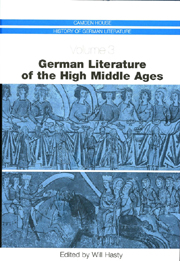Book contents
- Frontmatter
- Contents
- List of Illustrations
- Acknowledgments
- Introduction
- Part I The First Flourishing of German Literature
- Part II Lyric and Narrative Traditions
- Part III Continuity, Transformation, and Innovation in the Thirteenth Century
- Wirnt von Gravenberg's Wigalois and Heinrich von dem Türlin's Diu Crône
- Der Stricker
- Rudolf von Ems
- Ulrich von Liechtenstein
- Konrad von Würzburg
- Wernher der Gärtner
- Part IV Historical Perspectives
- Bibliography
- Notes on the Contributors
- Index
Konrad von Würzburg
from Part III - Continuity, Transformation, and Innovation in the Thirteenth Century
Published online by Cambridge University Press: 05 February 2013
- Frontmatter
- Contents
- List of Illustrations
- Acknowledgments
- Introduction
- Part I The First Flourishing of German Literature
- Part II Lyric and Narrative Traditions
- Part III Continuity, Transformation, and Innovation in the Thirteenth Century
- Wirnt von Gravenberg's Wigalois and Heinrich von dem Türlin's Diu Crône
- Der Stricker
- Rudolf von Ems
- Ulrich von Liechtenstein
- Konrad von Würzburg
- Wernher der Gärtner
- Part IV Historical Perspectives
- Bibliography
- Notes on the Contributors
- Index
Summary
UNTIL THE FIFTEENTH CENTURY, Konrad was not only the most productive medieval German author, but he also represented the broadest spectrum of genres. Though this is quite unusual for his time, Konrad worked in all three of the major vernacular lyric genres simultaneously, composing a secular and a religious Leich (lay; a long lyrical form not divided into strophes), twenty-three love songs, and more than fifty moraldidactic poems (Sangsprüche). Beyond this, he wrote three courtly romances, Partonopier und Meliur (based on a French source), Der Trojanerkrieg (The Trojan War, based on French and Latin sources), and Engelhard with its lengthy strophic prologue (with no known source, but based on the Latin story of friendship between Amicus and Amelius). The latter work, because of its brevity (only 6504 verses), can perhaps be regarded as an experiment with the usually longer epic form. The courtly legenda is represented by Silvester, Alexius, and Pantaleon, each of which manifests a different type of saint. Shorter secular verse narratives are Der Schwanritter (The Swan Knight, from the Lohengrin material), Das Turnier von Nantes (The Tournament of Nantes; perhaps based on the Clipearius Teutonicorum of Konrad von Mure [d. 1281]), Das Herzmäre (Tale of the Heart), Heinrich von Kempten, and Der Welt Lohn (Reward of the World). The most richly transmitted work of Konrad, Die Goldene Schmiede (The Golden Smithy, in about 2000 rhymed couplets), in which his poetic art is most elaborately and ornately developed, was especially important in shaping the perception of Konrad in the Middle Ages.
- Type
- Chapter
- Information
- German Literature of the High Middle Ages , pp. 243 - 254Publisher: Boydell & BrewerPrint publication year: 2006



